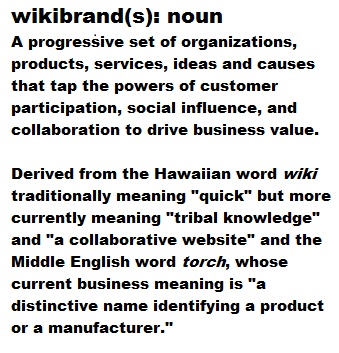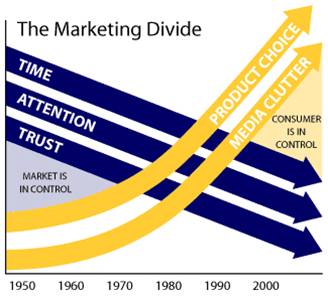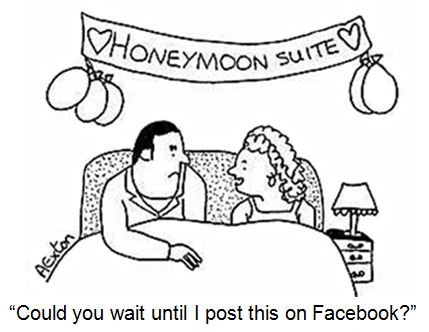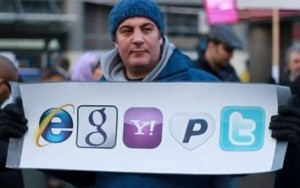 All of you wonderful marketers, public relations, advertising and communications folks out there who have a lock on and already have a dialed in plan for social networking and the impact it will have on your brand and/or business need to read no further. For the rest of you, I suggest you may want to learn what a wikibrand is.
All of you wonderful marketers, public relations, advertising and communications folks out there who have a lock on and already have a dialed in plan for social networking and the impact it will have on your brand and/or business need to read no further. For the rest of you, I suggest you may want to learn what a wikibrand is.
After beginning the book with a short history of on brands and the phases of brand development since 1860, co-authors Sean Moffitt and Mike Dover compare the period of transition to social we are now currently in, to the Mad Men period of transition from radio/print to television.
But the power to be gained by transitioning to a wikibrand mindset really comes from recognizing and developing a better understanding of, then leading your organization across the Marketing Divide (see below graphic). Even more importantly, the book explores how marketers, through leading the migration across this divide to a social future, have the opportunity to again elevate the marketing function to it’s rightful place leading the parade of an engaged and dynamically connected company and it’s community of customers.

Not sure if this is another Mad men reference, but the authors also lay out and detail their FLIRT concept which represents Focus, Language and content, Incentives, motivation and outreach, Rules and rituals and lastly Tools and platforms. This represents the construct Moffitt and Dover recommend to build out a wikibrand and I will leave it to the authors to further convey as they explain fully in the book.
Once you’ve mastered the concepts around flirting, it’s time to get your wikibrand show on the road with what they describe as “Incubating Your Wikibrand Community” including sharing insightful methods for community development, internalization, management and of course measurement & metrics.
Wrapping up, in his Foreword to the book, “Reinvention of the Brand” Don Tapscott suggests this may be a seminal work and I tend to agree. I say this because too many marketers out there are still treating social as an oddity and handling it with their kid gloves. If Wikibrands does nothing else(and it does), it should through the logical analysis and evolutionary brand progression provided, lead marketers still offside with social to the realization that it is far from an oddity, but rather a portal to our emerging future.
Jeff Ashcroft
@TheSocialCMO
Full disclosure: For purposes of transparency, we did receive a review copy of the Wikibrands book.
 In my continuing series of blog posts on gaining that proverbial “seat” at the senior management table, I have discussed the importance of being more agile and social in marketing, and throughout the entire revenue process. In this week’s post, I focus on the importance of being increasingly more “connected” in all of your marketing, sales, and revenue-oriented activities.
In my continuing series of blog posts on gaining that proverbial “seat” at the senior management table, I have discussed the importance of being more agile and social in marketing, and throughout the entire revenue process. In this week’s post, I focus on the importance of being increasingly more “connected” in all of your marketing, sales, and revenue-oriented activities. Through some recent debate about which social tools are best and why, I have been listening and reflecting on how my own business has been impacted. It is one thing to spend your time researching and writing and another to spend your time helping 20+ clients win everyday in this 24/7 viral world we live in. The challenge is surfing through it all to find what works for you and your business. Time will limit what resources companies can dedicate to the social channels. I think some channels are better for certain businesses. Digital and social don’t mean a “one size fits all” strategy.
Through some recent debate about which social tools are best and why, I have been listening and reflecting on how my own business has been impacted. It is one thing to spend your time researching and writing and another to spend your time helping 20+ clients win everyday in this 24/7 viral world we live in. The challenge is surfing through it all to find what works for you and your business. Time will limit what resources companies can dedicate to the social channels. I think some channels are better for certain businesses. Digital and social don’t mean a “one size fits all” strategy.  Join us for The Four Hats of The Social CMO webinar for a unique look at four roles emerging marketing leaders can embrace as they evolve to become Social CMOs!
Join us for The Four Hats of The Social CMO webinar for a unique look at four roles emerging marketing leaders can embrace as they evolve to become Social CMOs!
 This post is for anyone who has had to ask (or been on the receiving end of the query) where did our social media marketing strategy go wrong?
This post is for anyone who has had to ask (or been on the receiving end of the query) where did our social media marketing strategy go wrong? Do social media technologies isolate people and promote false relationships? Or are there important benefits associated with being connected to others in this way?
Do social media technologies isolate people and promote false relationships? Or are there important benefits associated with being connected to others in this way?

 Now that the Wall Street Journal is writing about them, you probably already know about Klout. If you’re using Hootsuite, your Klout score, and the Klout score of your followers, is front-and-center. Here are four ways you can increase your Klout score.
Now that the Wall Street Journal is writing about them, you probably already know about Klout. If you’re using Hootsuite, your Klout score, and the Klout score of your followers, is front-and-center. Here are four ways you can increase your Klout score. All of you wonderful marketers, public relations, advertising and communications folks out there who have a lock on and already have a dialed in plan for social networking and the impact it will have on your brand and/or business need to read no further. For the rest of you, I suggest you may want to learn what a wikibrand is.
All of you wonderful marketers, public relations, advertising and communications folks out there who have a lock on and already have a dialed in plan for social networking and the impact it will have on your brand and/or business need to read no further. For the rest of you, I suggest you may want to learn what a wikibrand is.